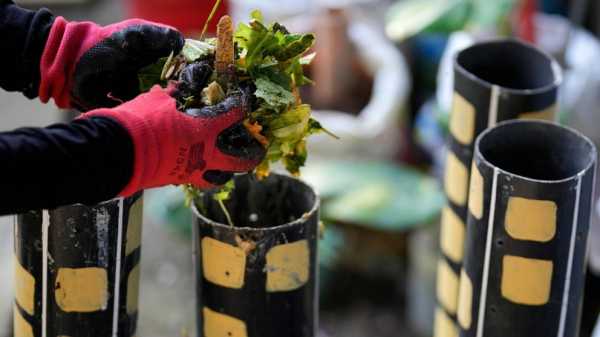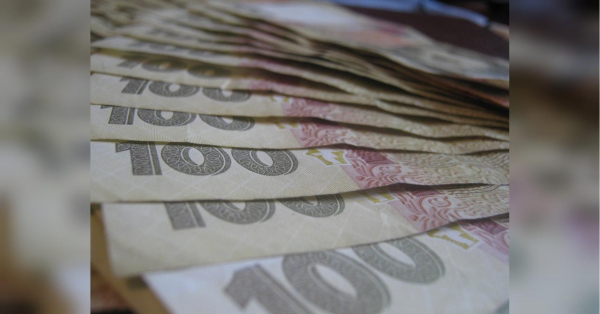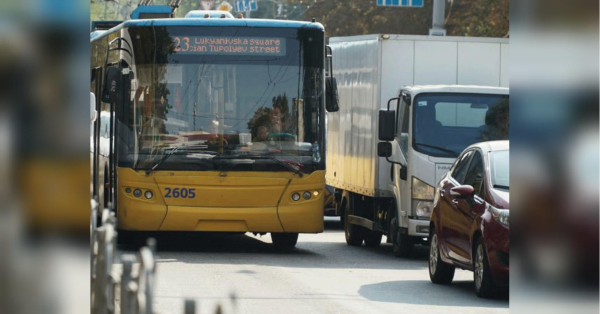
MALABON, Philippines — Marilene Capentes pushes a cart along the streets of Malabon city just north of Manila every morning except Sundays, collecting bags of segregated garbage.
She places the food waste in a designated container so it can be turned to compost at the local recycling facility. The rest of the waste goes into separate containers and the recyclables are later sold.
Capentes, who is 47, said the trash used to be all mixed together — and heavy — until a local environmental nonprofit started asking residents to separate it a few years ago. The Mother Earth Foundation in the Philippines, as a member of the Global Alliance for Incinerator Alternatives, is trying to prevent food waste from going to landfills, where it emits methane as it breaks down and rots. Methane is an extraordinarily powerful greenhouse gas responsible for about 30% of today’s global warming.
Along Capentes' route, 50-year-old resident Vilma Mendoza now understands the importance of diverting organic waste from landfills to reduce methane emissions to try to limit future warming.
"If you mixed biodegradable to the non-biodegradable and throw it in the landfill, our environment will suffer,” she said.
Preventing waste from going into landfills, incinerators or the environment is a proven, affordable climate solution, according to GAIA. The international environmental organization, which advocates for waste reduction, is supporting its members, including waste picker groups around the world, that are working with government officials to set up systems to segregate and collect organic waste and establish facilities to compost it.
This is happening mainly in the Global South where waste pickers are already working in many communities and cities. Millions of people worldwide make a living as waste pickers, collecting, sorting, recycling and selling materials such as plastics, paper, copper and steel.
The world needs better systems for dealing with waste because existing ways are contributing to climate change, said Kait Siegel, the waste sector manager on the methane pollution prevention team at the environmental nonprofit Clean Air Task Force. She said organics diversion and treatment is “absolutely” an important way to reduce methane emissions.
“We’ve seen these solutions make a difference in countries around the world,” she said. “We’re all creating organic waste in our day-to-day lives. And that’s something that we can be engaging with, in working towards slowing the pace of climate change.”
There's more interest in this strategy now because the Global Methane Pledge, launched in November 2021, has pushed countries to take a hard look at their sources of methane. More than 100 countries, including the United States, have agreed to reduce methane emissions by 30% by 2030, though other major methane emitters refused.
Methane is more potent at trapping heat than carbon dioxide, but doesn’t stay in the atmosphere nearly as long — around 12 years compared with centuries. Many see bringing down methane emissions as a crucial, quick way to curb further warming.
The largest anthropogenic source is agriculture, closely followed by the energy sector, which includes emissions from coal, oil, natural gas and biofuels, according to the International Energy Agency.
The waste sector is the third largest source of anthropogenic methane emissions worldwide, accounting for about 20% of the total. About 60% of waste in Global South communities is organic, according to GAIA. That's 130 tons of waste per day in just Malabon city, population 380,000.
At a materials recycling facility in Malabon, organic waste collected from households is turned into compost that goes into a community garden to grow vegetables. Some of the food waste goes into a biodigester that breaks it down to turn it into biogas, which is then used to cook vegetables for waste workers to eat. It's a complete cycle, said Froilan Grate, executive director of GAIA Asia Pacific. Workers typically each have a route of about 200 households, Grate added.
Grate, who is based in Manila, said there are challenges in establishing these systems in new places. It costs money upfront to set up a facility for composting, residents and local officials have to be educated on the importance of separating waste, bins have to be provided for households that can't afford more than one, and sometimes it's just not a priority. Also, unlike recyclables and metals, there isn’t a large market for organic materials so waste workers must be paid for the service they are providing for the system to work.
But Grate is confident these challenges can be overcome. More people are making the connection between reducing methane and addressing climate change, so there is more interest from cities and philanthropic groups that could help with startup costs, he said. And cities are seeing the benefits of sound waste management because it reduces vermin that cause disease, helps ensure cleaner drinking water, gives waste workers a sustainable livelihood and helps the planet, he added.
In the Philippines, cities pay waste workers with the money they save in tipping fees by sending fewer truckloads to landfills.
In Brazil, one of the world’s five largest methane emitters, there is now interest in supporting waste pickers, investing in waste recycling and fighting climate change since President Luiz Inácio Lula da Silva took office in January, said Victor Hugo Argentino de Morais Vieira, a zero waste adviser and researcher at Instituto Pólis.
A large composting site has been operating for years on the northeast coast in Bahia, an area popular with tourists. Waste pickers there developed a system themselves to collect organic waste from hotels and restaurants, but few other waste pickers collect food waste.
Jeane dos Santos in Salvador said she started working as a waste picker at the age of 7. She's now 41 and part of the National Movement of Waste Pickers of Brazil. She collects and sells recyclable waste, though a lot of it turns out to be either non-recyclable plastic or contaminated by food waste.
Dos Santos is part of a cooperative of waste pickers whose income derives solely from the recyclables they sell. She said she's interested in collecting organic waste if it could be segregated, because then the recyclable items won’t be contaminated and the waste pickers could earn money if the state supports these efforts.
“I earn enough to survive. However, I would like to earn more if we had the proper state support,” she said. “Currently, we provide a public service and we are not rewarded by that.”
Local waste pickers could educate households, and society, about how to properly separate their waste, dos Santos added.
In South Africa, it's also not common to separate organic waste. But for the past two years its been tested out at a large market in the port city of Durban.
“It can be a game changer for the continent,” said Niven Reddy, the African regional coordinator for GAIA. “It can be tested and tried. If it works in Africa in one place, it’s likely to work someplace else — 400,000 people go through that market a day.”
GAIA leaders like Reddy are looking to the systems established in the Philippines as a model.
“I do feel like it demonstrates the Global South's leadership on issues like this of methane reduction," he said. "I think it’s really impressive. And I feel like it’s highly implementable.”
_____
McDermott reported from Providence, Rhode Island.
___
Associated Press climate and environmental coverage receives support from several private foundations. See more about AP’s climate initiative here. The AP is solely responsible for all content.
Sourse: abcnews.go.com






